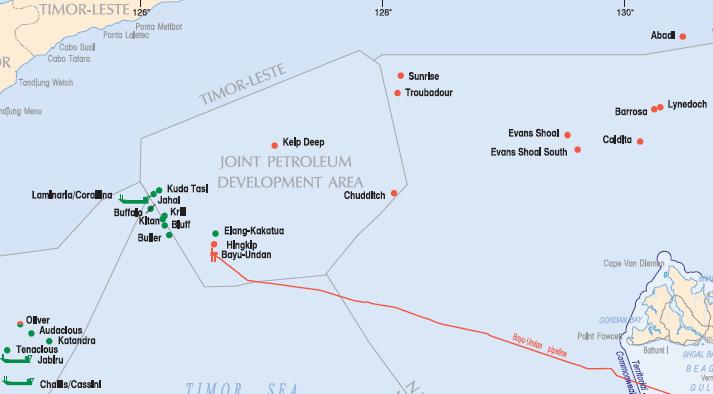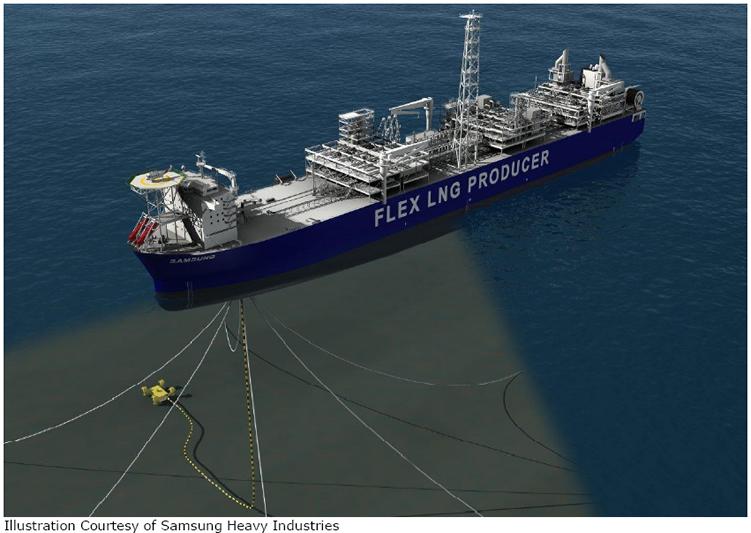 It might not be all smiles if they met today. East Timorese president Xanana Gusmao with Kevin Rudd. Pic: Ray Strange / File
It might not be all smiles if they met today. East Timorese president Xanana Gusmao with Kevin Rudd. Pic: Ray Strange / File
Gusmao has also been claiming Australian interference in its sovereign rights. Australia is studying the rhetoric closely, with good reason. As Gusmao slams Australia, his country’s biggest aid donor, Gusmao has allowed China for the first time to gain a small de facto military foothold in East Timor.
China now has naval training crews operating out of Dili aboard two gunboats which East Timor bought from China, and which were formally handed over last week. Gusmao’s attacks on Australia, and his newfound military cooperation with China, are seen as related.
It all ties into Gusmao’s fury that Woodside Petroleum, an Australian company, has decided to build a floating natural gas platform in the Greater Sunrise field in the Timor Sea, rather than piping the liquefied gas onshore to Timor. Gusmao wants to see the gas coming ashore in Timor, in order to kick-start real industry in his country, and to provide Timorese with skills.
Woodside thinks building a pipeline across deep water to Timor, and an onshore plant, is too expensive. Gusmao appears to have the notion that the Australian government is an arm of Woodside, and that it is actively supporting Woodside’s decision. He is threatening to block the project, which would see $32bn in revenue shared between the governments of Timor and Australia.
While it has been known for several years that East Timor would buy the Jaco-class patrol boats from China, it was not anticipated that they would be operated by, for the foreseeable future, the Chinese navy. Fairfax media reported this as a “slap in the face for Australian diplomacy”.
It is just a couple of boats, and it makes sense that the Chinese navy should provide training to the people who buy their boats. But up till now, the role of training Timorese military has fallen, by mutual consent, to Australia.
China is interested in Timor’s oil and gas, not to mention its strategic location. It has been a heavy donor, gifting the people of Timor an imposing presidential palace, a defence force headquarters and ministry of foreign affairs building. Now it is forging what could be seen as military ties.
“Australia is reasonably relaxed but there is probably concern that China is increasing its influence in Timor in fairly direct ways,” said Professor Damien Kingsbury, a Timor expert at Deakin University’s School of International and Political Studies. “It’s not just soft power and generous aid. When you have Chinese crews on Chinese military vessels, in Timorese waters under a Timorese flag, it does potentially raise concerns.”
East Timor nestles between Indonesia and Australia. Both countries might – along with the US – be uncomfortable about the new arrangements with China, especially when seen in light of Gusmao’s increasingly intemperate remarks about Australia.
On Friday, at the handover ceremony of the patrol boats, Gusmao attacked on Australia’s supposed interference in its sovereign rights. This was presumably done for the benefit of Australia’s ambassador to East Timor, Peter Heywood, who attended.
Gusmao said: “This decision [to buy the boats from China] caused some public outcry, and above all, drew criticism from some countries, particularly Australia, which was greatly surprised at not having been consulted in this process.”
In fact, East Timor’s decision to buy the boats drew no public outcry from Australian political leaders whatsoever, nor has there been any public condemnation of the decision to use Chinese naval crews. But Indonesia and Australia, which each sent a naval patrol boat to the ceremony, must have listened on bemused.
Kingsbury doubts Australia diplomats have privately dressed down Gusmao over the gunboats, or his remarks in general, and are instead maintaining a gentle and conciliatory approach. But Gusmao is clearly nursing a savage temper for Australia and no one is too sure where it will take him.
Gusmao has been remarkably forgiving on Indonesia for the blood it spilt on his land, but he is not so forgiving with Australia when it comes to oil and gas. The anger goes back to 1989, when former foreign minister Gareth Evans, with his Indonesian counterpart, Ali Alatas, signed the Timor Sea Treaty, which divided oil and gas spoils off the south coast of Timor and, once again, confirmed the official Australian view that Indonesia’s occupancy of Timor was legitimate.
In 2005, with East Timor now independent, then foreign minister, Alexander Downer, struck an agreement to defer for 50 years all maritime disputes in the Timor Gap, and for government revenues from the Greater Sunrise oil and gas field (which hangs over the edge of the Timor Gap area, in disputed waters) to be shared 50:50 between the two countries.
Many East Timorese believe Australia has ripped them off on oil and gas, by claiming its territorial waters push right up against the south coast of Timor. But Timor’s frustrations on this have been relatively mute for several years (perhaps in the light of the Australian military being called in, twice since 2006, to restore order within the country).
Gusmao reactivated the bitterness in a speech to development partners in Dili, on April 7. He veered widely from the subject of development, complaining (accurately) that the US had given Indonesia permission to invade East Timor in 1975, and adding that the US, France and Germany had provided Indonesia with “weapons, tanks, fighters and training, so as to annihilate the resistance of our small guerrilla army”.
He saved the real blast for Australia. “Adding insult to injury,” he said, “after recognising the integration – the only Western country to do so – Australia signed an agreement with Indonesia, in 1989, to share the wealth of the Timor Sea. Meanwhile, around 200,000 Timorese died trying to protect their rights during the 24 years of war.
“[W]e had the Japanese occupation from 1941 to 1945. Although short-lived, this occupation covered the entire country and caused great suffering to the Timorese, including the deaths of around 60,000 people. According to reliable opinions, this suffering could have been prevented if the Australian forces had not come to Timor-Leste in order to wage war here, so as to prevent the Japanese from invading Australia.”
It was true that Australia had gone to (then) Portuguese Timor in order to protect Australia. But what was Gusmao saying? That the occupancy of the Japanese imperial army was preferable? And what, by the way, would have become of the Timorese people at war’s end had they sided openly with Japan?
More to the point, why bring this up at a development partners meeting? The subtext was Woodside.
“Gusmao has been ramping this up over the last six or so weeks,” said Kingsbury. “Australia has been wondering where all this is coming from. On one hand, the formal relationship is in pretty good shape, but some of the rhetoric is pretty fiery and there is concern that it has the potential to destabilise the relationship.
“It’s overwhelmingly about Woodside. There’s a couple of other issues about the direction of Australia aid, but if you dig down even that is predicated on having a go at Australia about Woodside. The view in Timor is that the Australian government has a direct hand in the Woodside process. The view of Australia, obviously, is that it doesn’t.”
Kingsbury said comments by Resources Minister Martin Ferguson that Woodside’s decision to build a floating plant was purely commercial, and that the government had no say in it, was interpreted in Timor as Ferguson’s implicit support of Woodside.
“There is an assumption that the Australian government has a capacity to control Woodside,” said Kingsbury. Gusmao seems to think the Australian government could – or should - threaten Woodside into piping gas onshore to Timor. “But that would make current debate over the resources tax a drop in the ocean,” said Kingsbury. “That would be direct interference in the commercial operations of a private company and short of Australia becoming Cuba, I can’t see that happening.”
At the gunboat handover ceremony on Friday, Gusmao told those present that East Timor could not consider itself independent “if every time we are to make a fundamental decision, we have to consult our neighbouring, friendly and partner countries”.
Even as the overall level of Australian aid to East Timor increases, Gusmao is indeed well within his rights to make sovereign decisions. But it appears he is intent on dragging some of the quiet off-stage concerns that Australia has expressed to him into the light. And he is sidling up to China in order to vent his anger at Australia over Woodside.
“Australia is probably looking askance at the crews because that does put a Chinese military presence pretty close to Australian sovereign waters,” said Kingsbury. “That’s a legitimate issue but there hasn’t been anything public said about it. There may have been some private discussions, but no bullying or threats associated with it. I think it’s a case that any commentary, or discussion, is perceived as interference.
“That’s a very traditional position for a number of countries in South-East Asia. If there is any commentary on affairs in China, that’s seen as interference. Up until 1998, in Indonesia, they took the same view.”
Kingsbury believes that East Timor considers, for the time being, Australia a more valuable friend than China. So is this just a little dummy spit by Gusmao, a reflection of his desire to see Timor stand on its own, or something more?
“They’re very aware of the reality of geographic proximity and they’re very aware Australia is easily their biggest aid donor, and is likely to continue to be,” said Kingsbury. “They’re very aware that the boundary maritime issues need to be negotiated with Australia in the future. Australia, particularly under Downer, has played a tough game. They know Australia can be a good friend but a tough opponent. But they’re not going to make an enemy out of Australia.”
Yet it appears that is precisely what Gusmao is trying to do. Kingsbury says it must be remembered that Gusmao is currently working across the nation, trying to talk up a major infrastructure program to improve roads, water, sanitation and electricity. The people on the south coast of Timor are particularly bereft when it comes to these basic commodities, and Gusmao believes if Woodside were to come onshore in that part of Timor, much would improve for them.
“What is disconcerting to the Australian government is the intemperate and the inflammatory use of language,” said Kingsbury. “Xanana and the government have done pretty well in the first few years of office, but not everything’s gone their way. (Opposition party) Fretilin has scored some wins in the nationalist debate and certainly Xanana’s having a go at Australia, but he’s also speaking to a domestic audience as he talks up the infrastructure program. He’s trying to rally the troops.”
Australia has been a schizophrenic friend to Timor, variously abandoning it, liberating it, screwing it and helping it. And it is arguable that our debts to Timor are not yet paid in full. Perhaps mindful of that, Australia is letting Gusmao rant and rave, hoping he’ll calm down before he says – or does – something he might truly regret.
SOURCE: THE PUNCH





